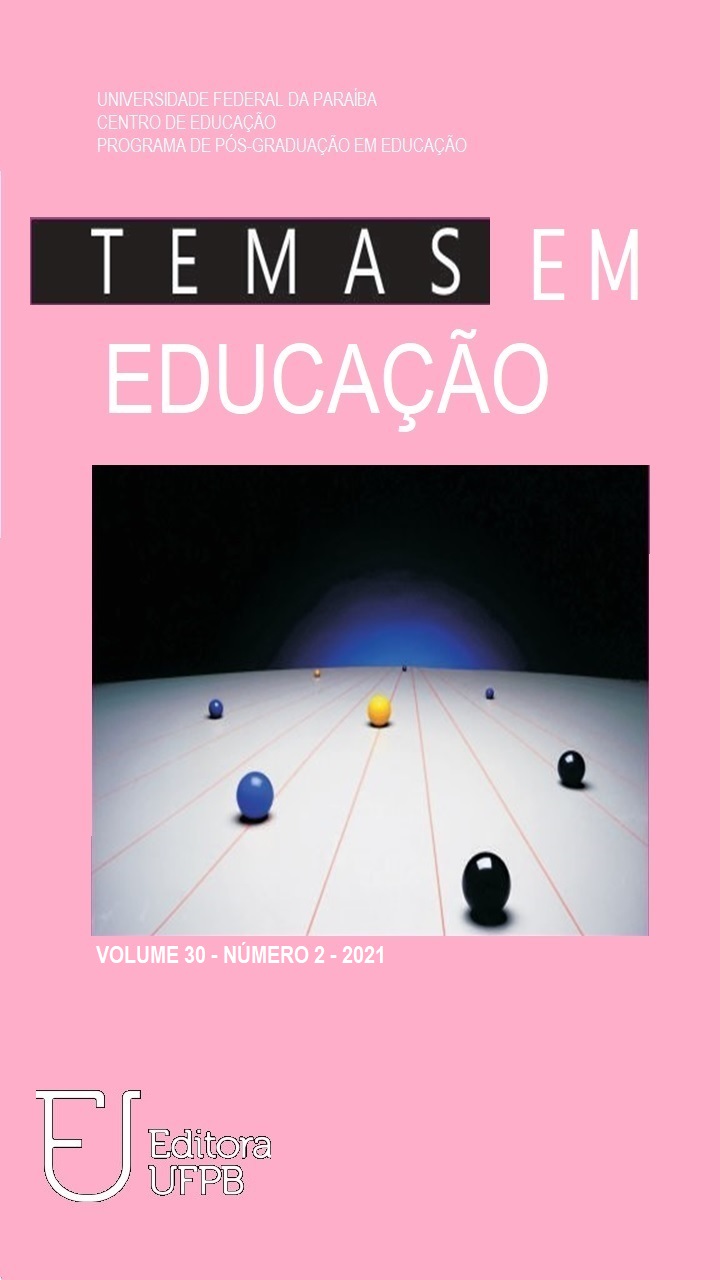Beyond reason
Radical teaching and learning experiences in Social Sciences (a reflection on the "Utopian Topics" course, 2018-2018)
DOI:
https://doi.org/10.22478/ufpb.2359-7003.2021v30n2.57645Keywords:
Utopia, Educação não-formal, Ensino de sociologia, Experiências pedagógicas, Não-racionalAbstract
The article reports radical pedagogical experiences conducted between 2017 and 2018 as part of an extension course at the Federal University of Santa Catarina called Utopian Topics. The course aimed to deal with unusual themes in the specialized disciplines of Social Sciences (Anthropology, Sociology, Political Science), exploring original dynamics of stimulating learning and collective construction of knowledge. Around topics such as love, death, magic, dream, the course reached 164 people, from all academic levels, with varying degrees of engagement. The teaching strategies adopted aimed to explore non-rational and unconventional aspects of the construction of knowledge - art, play, body, affection, collectiveness, spontaneity, etc. The combination of a wide variety of learning dynamics has stimulated the dissolution of boundaries between the rational and the extra-rational, producing intense experiences in creativity, risk, study, and understanding. Such practices mobilized the concepts of libertarian and non-formal education, elements of other areas of knowledge and even non-academic knowledge.
Downloads
References
BATESON, Gregory. Mente e natureza: uma unidade necessária. Rio de Janeiro: Ed. Francisco Alves, 1986.
BOLTANSKI, Luc; CHIAPELO, Ève. O novo espírito do capitalismo. São Paulo: Martins Fontes, 2009. (Introdução - p. 35-58)
BOURDIEU, Pierre; PASSERON, Jean-Claude. A Reprodução: Elementos para uma teoria do sistema de ensino. Rio de Janeiro: Edições Francisco Alves, 1975.
COMITÊ INVISÍVEL. Aos nossos amigos: crise e insurreição. São Paulo: n-1 edições, 2016.
COMITÊ INVISÍVEL. Motim e destituição: agora. São Paulo: n-1 edições, 2017.
DELEUZE, Gilles. Nietzsche e a filosofia. Tradução de Luiz Orlandi. Rio de Janeiro: Editora Rio, 1976.
DELEUZE, Gilles; GUATTARI, Félix. Mil Platôs, v. 1. São Paulo: Editora 34, 2011a.
DELEUZE, Gilles. GUATTARI, Félix. Mil Platôs, v. 5. São Paulo: Editora 34, 2011b.
DELEUZE, Gilles; GUATTARI, Félix. O que é a filosofia? Tradução: Bento Prado Jr. e Alberto Alonso Muñoz. Rio de Janeiro: Ed. 34, 1992.
DERRIDA, Jacques. A universidade sem condição. São Paulo: Estação Liberdade, 2003.
DUARTE, Pedro. A utopia do pensamento. In: NOVAES, Adauto (Org.). O novo espírito utópico. São Paulo: Edições Sesc São Paulo, 2016.
EIDAM, Heinz; TOMAZETTI; Elisete M.; SANTOS, Robinson. Questionamentos filosóficos em sala de aula: ou 27 teses para uma necessária ignorância do professor. Revista Filosofazer, v. 18, n. 34, 2009.
FOUCAULT, Michel. Microfísica do poder. São Paulo: Graal, 2013.
FOUCAULT, Michel. Vigiar e punir: nascimento da prisão. Petrópolis: Vozes, 1999.
GARDNER, Howard. Estruturas da mente: A teoria das inteligências múltiplas. Porto Alegre: Artes Médicas Sul, 1994.
HOLLOWAY, John. Fissurar o capitalismo. São Paulo: Publisher Brasil, 2013.
ILLICH, Ivan. Sociedade sem escolas. Petrópolis, Rio de Janeiro: Ed. Vozes. 1979.
LAKOFF, George.; JOHNSON, Mark. Philosophy in the flesh: the embodied mind and its challenge to western thought. New York: Basic Books, 1999.
MORIN, Edgar. A cabeça bem-feita: repensar a reforma, reformar o pensamento. Rio de Janeiro: Bertrand Brasil, 2010.
NEIL, Alexander Sutherland. Liberdade sem medo. São Paulo: Brasiliense, 1978.
NIETZSCHE, Friedrich. Gaia Ciência [1882]. São Paulo: Ed. Cia das Letras, 2005.
ONETO, Paulo D. A Nomadologia de Deleuze-Guattari. [S. l.], Lugar Comum, n. 23-24, p. 147-161, 2010.
RAMO Y AFFONSO, Ana Maria. O corpo do xamã e a passagem de Carlos Castaneda. 2008. 91 f. Dissertação (Mestrado em Antropologia) - Faculdade de Filosofia e Ciências Humanas, Universidade Federal de Minas Gerais, Belo Horizonte, 2008.
RANCIÈRE, Jacques. O mestre ignorante: cinco lições sobre a emancipação intelectual. Belo Horizonte: Autêntica, 2007.
ROGERS, Carl. Liberdade para aprender. Belo Horizonte: Interlivros, 1977.
ROGERS, Carl. Tornar-se pessoa. São Paulo: Martins Fontes, 1961.
SOUSANIS, Nick. Desaplanar. São Paulo: Ed. Veneta, 2017.
SPIVAK, Gayatri. Pode o subalterno falar? Belo Horizonte: Ed. UFMG, 2010.
STREECK, Wolfgang. How Will Capitalism End?. New Left Review, n. 87, 2014, p. 35-64.
TARDE, Gabriel. Monadologia e Sociologia e Outros Ensaios. São Paulo: Cosac & Naify, 2007. 286 pp.
VARGAS, Eduardo V. Gabriel Tarde e a diferença infinitesimal. In: TARDE, Gabriel. Monadologia e Sociologia e Outros Ensaios. São Paulo: Cosac & Naify, 2007. 286 pp.
VIVEIROS DE CASTRO, Eduardo. Filiação intensiva e aliança demoníaca. Novos estud. - CEBRAP, São Paulo, n. 77, p. 91-126, mar. 2007.
WRIGHT, Erik Olin. How to be an Anticapitalist today. Jacobin Magazine. Disponível em: https://www.jacobinmag.com/2015/12/erik-olin-wright-real-utopias-anticapitalism-democracy/. Acesso em: 01 mar. 2020.
Downloads
Published
How to Cite
Issue
Section
License
Copyright (c) 2021 Revista Temas em Educação

This work is licensed under a Creative Commons Attribution 4.0 International License.
Authors who publish in this journal agree to the following terms:
. Authors retain the copyright and grant the journal the right to first publication, with the work simultaneously licensed under the Licença Creative Commons Attribution that allows the sharing of the work with acknowledgment of authorship and initial publication in this magazine. . Authors are authorized to assume additional contracts separately, for non-exclusive distribution of the version of the work published in this journal (eg, publishing in institutional repository or as a book chapter), with acknowledgment of authorship and initial publication in this journal.
. Authors are permitted and encouraged to publish and distribute their work online (eg in institutional repositories or on their personal page) at any point before or during the editorial process, as this can generate productive changes, as well as increase impact and citation of the published work (See O Efeito do Acesso Livre).



















